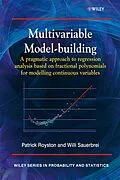Multivariable regression models are of fundamental importance in all areas of science in which empirical data must be analyzed. This book proposes a systematic approach to building such models based on standard principles of statistical modeling. The main emphasis is on the fractional polynomial method for modeling the influence of continuous variables in a multivariable context, a topic for which there is no standard approach. Existing options range from very simple step functions to highly complex adaptive methods such as multivariate splines with many knots and penalisation. This new approach, developed in part by the authors over the last decade, is a compromise which promotes interpretable, comprehensible and transportable models.
Autorentext
Patrick Royston DSc, is a senior statistician and cancer clinical realist at the MRC Clinical Trials Unit, London, an honorary professor of statistics at University College London and a fellow of the Royal Statistical Society. he has authored many research papers in biostatistics, and has published over 150 articles in leading statistical journals. Patrick is an experienced statistical consultant, Stata programmer and software author.
Willi Sauerbrei PhD, is a senior statistician and professor in medical biometry at the IMBI, University Medical Center Freiburg. He has authored many research papers in biostatistics and has published over 100 articles in leading statistical and clinical journals. He worked for more than two decades as an academic biostatistician and has extensive experience of cancer research, with a particular concern for breast cancer.
Klappentext
Multivariable regression models are widely used in all areas of science in which empirical data are analysed. Using the multivariable fractional polynomials (MFP) approach this book focuses on the selection of important variables and the determination of functional form for continuous predictors. Despite being relatively simple, the selected models often extract most of the important information from the data. The authors have chosen to concentrate on examples drawn from medical statistics, although the MFP method has applications in many other subject-matter areas as well. Multivariable Model-Building:
- Focuses on normal-error models for continuous outcomes, logistic regression for binary outcomes and Cox regression for censored time-to-event data. Concentrates on fractional polynomial models and illustrates new approaches to model critisism and stability. Provides comparisons with and discussion of other techniques such as spline models. Features new strategies on modelling interactions with continuous covariates which are important in the context of randomized trials and observational studies Does not consider high-dimensional data, such as gene expression data. Is illustrated throughout with working examples from more than 20 substantial real datasets, most data sets and programs in Stata are available on a website enabling the reader to apply techniques directly Is written in an accessible and informal style making it suitable for researchers from a range of disciplines with minimal mathematical background
Inhalt
Preface.
1. Introduction.
1.1 Real-Life Problems as Motivation for Model Building.
1.2 Issues in Modelling Continuous Predictors.
1.3 Types of Regression Model Considered.
1.4 Role of Residuals.
1.5 Role of Subject-Matter Knowledge in Model Development.
1.6 Scope of Model Building in our Book.
1.7 Modelling Preferences.
1.8 General Notation.
2. Selection of Variables.
2.1 Introduction.
2.2 Background.
2.3 Preliminaries for a Multivariable Analysis.
2.4 Aims of Multivariable Models.
2.5 Prediction: Summary Statistics and Comparisons.
2.6 Procedures for Selecting Variables.
2.7 Comparison of Selection Strategies in Examples.
2.8 Selection and Shrinkage.
2.9 Discussion.
3. Handling Categorical and Continuous Predictors.
3.1 Introduction.
3.2 Types of Predictor.
3.3 Handling Ordinal Predictors.
3.4 Handling Counting and Continuous Predictors: Categorization.
3.5 Example: Issues in Model Building with Categorized Variables.
3.6 Handling Counting and Continuous Predictors: Functional Form.
3.7 Empirical Curve Fitting.
3.8 Discussion.
4. Fractional Polynomials for One Variable.
4.1 Introduction.
4.2 Background.
4.3 Definition and Notation.
4.4 Characteristics.
4.5 Examples of Curve Shapes with FP1 and FP2 Functions.
4.6 Choice of Powers.
4.7 Choice of Origin.
4.8 Model Fitting and Estimation.
4.9 Inference.
4.10 Function Selection Procedure.
4.11 Scaling and Centering.
4.12 FP Powers as Approximations to Continuous Powers.
4.13 Presentation of Fractional Polynomial Functions.
4.14 Worked Example.
4.15 Modelling Covariates with a Spike at Zero.
4.16 Power of Fractional Polynomial Analysis.
4.17 Discussion.
5. Some Issues with Univariate Fractional Polynomial Models.
5.1 Introduction.
5.2 Susceptibility to Influential Covariate Observations.
5.3 A Diagnostic Plot for Influential Points in FP Models.
5.4 Dependence on Choice of Origin.
5.5 Improving Robustness by Preliminary Transformation.
5.6 Improving Fit by Preliminary Transformation.
5.7 Higher Order Fractional Polynomials.
5.8 When Fractional Polynomial Models are Unsuitable.
5.9 Discussion.
6. MFP: Multivariable Model-Building with Fractional Polynomials.
6.1 Introduction.
6.2 Motivation.
6.3 The MFP Algorithm.
6.4 Presenting the Model.
6.5 Model Criticism.
6.6 Further Topics.
6.7 Further Examples.
6.8 Simple Versus Complex Fractional Polynomial Models.
6.9 Discussion.
7. Interactions.
7.1 Introduction.
7.2 Background.
7.3 General Considerations.
7.4 The MFPI Procedure.
7.5 Example 1: Advanced Prostate Cancer.
7.6 Example 2: GBSG Breast Cancer Study.
7.7 Categorization.
7.8 STEPP.
7.9 Example 3: Comparison of STEPP with MFPI.
<…